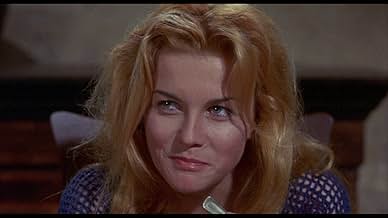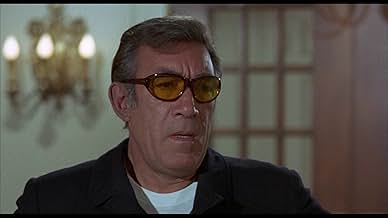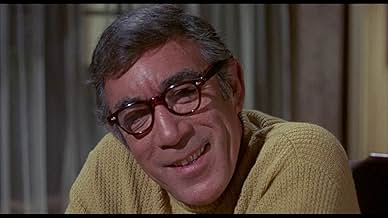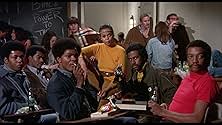Adicionar um enredo no seu idiomaR.P.M. stands for (political) revolutions per minute. Anthony Quinn plays a liberal college professor at a west coast college during the heady days of campus activism in the late 1960's. Rad... Ler tudoR.P.M. stands for (political) revolutions per minute. Anthony Quinn plays a liberal college professor at a west coast college during the heady days of campus activism in the late 1960's. Radical students take over the college, the president resigns, and Quinn's character, who has... Ler tudoR.P.M. stands for (political) revolutions per minute. Anthony Quinn plays a liberal college professor at a west coast college during the heady days of campus activism in the late 1960's. Radical students take over the college, the president resigns, and Quinn's character, who has always been a champion of student activism, is appointed president.
- Estella
- (as Ines Pedroza)
- Director
- Roteirista
- Elenco e equipe completos
- Produção, bilheteria e muito mais no IMDbPro
Avaliações em destaque
Woodstock was in August of 1969. Altamont was in December of 1969. This means that the Woodstock Nation lasted barely four months. Elizabeth Taylor has kept husbands longer than that.
What the major studios did was get mainstream directors and told them make movies about youth in revolt. The result was movies like this which were very expensive imitations of movies that American-International had made in the sixties on nonexistent budgets.
RPM is watchable for a fine performance by Anthony Quinn. Lord, but he's a trooper. The script was obsolete before the ink dried on it. I'll be generous and say that Eric Segal's screenplay stinks. Of course, forty years later LOVE STORY doesn't get all that much love anyway.
The story centers on a Sociology professor who is picked to be president of a fictional college after protesting students occupy the administration building. The board has a late night meeting and decides to appoint Quinn president based primarily on the fact that he's sleeping with a graduate student in his department who is young enough to be his daughter.
Imagine trying to sell that to a major studio in today's Politically Correct world. Ann-Margret plays the graduate student and recognizes the script to be crap, so she has fun playing this airhead and wears ridiculous costumes and, in one scene, talks with while chewing food so that audiences won't have to understand the words she's saying.
Incredibly, this is directed by Stanley Kramer. Kramer had become a legend directing films like THE DEFIANT ONES, INHERIT THE WIND, SHIP OF FOOLS, JUDGMENT AT NUREMBERG, and GUESS WHO'S COMING TO DINNER, all of which dealt with Big Ideas from a socially progressive point of view. More importantly, they were full of characters that audiences could identify with and were fully realized human beings.
RPM is like a pageant put on by a community college Sociology department. Characters represent Sexual Freedom, Corporate Apathy, Prejudice, Sexual Liberation, Black Power, etc.
At its peak, the student revolution actually appealed to a very small per cent of students and had little support from the mainstream community. Worse yet, this film was released in the middle of Nixon's first term of office. Youthful idealism faded as more students pursued graduate studies in Business Administration.
Thanks to Turner Classic Movies for running this. I'd heard of it, but figured that Columbia Pictures had destroyed all the existing prints hoping nobody would remember it. Somehow TCM found a pristine print in excellent condition. It would have gotten just one out of ten, but I had to recognize Quinn's excellent work trying to make a dead horse run.
Anthony Quinn gives one of his finest "latter" years roles as F.W.J. "Paco" Perez. Quinn's character is a liberal fighting, social changing sociology professor who has earned the respect of the rebellious student population at his university. The students want changes now, but are unwilling to compromise. Stanley Kramer shows that there were "no easy" solutions to the various generational problems for the times. Ann-Margret is in her "sexiest" prime, but also shines as a Perez "grupie". Also, Gary Lockwood as the militant student leader gives a creditable performance.
Revolutions Per Minute is a great trip down memory lane and helps capture the atmosphere of 1970.
Leader of a student group taking over a university's computer center, Lockwood... along with another thirty-something student Paul Winfield... have demands they give to a liberal professor they once really liked...
That's where star Anthony Quinn, hired as a kind of emergency dean/president, comes in: spending most of the picture either having long discussions with comparably stuffy and conservative university profs or hanging out with young girlfriend Ann-Margret, who, like Lockwood, has little to do here but spout smug counter-culture platitudes in what feels more like a progressive TV-movie than a watered-down big-screen expose of college revolutionaries (very timely here in 2024), hence the R. P. M. Title standing for Revolutions Per Minute...
But there's only one revolution here, and it drags, despite Lockwood having a few good monologues opening up to Quinn... yet the audience can never fully get into his shared plight/agenda since otherwise sympathetic left-wing director and scriptwriter Stanley Kramer and Erich Segal never properly flesh-out the characters to grow past clichés - on either side of the aisle.
The campus radicals, led by 33-year-old long-haired undergraduate Gary Lockwood, have occupied one of the buildings on campus, and have a list of demands. One of them is that the students should hire the faculty. (After being in academia for 40 years, I will admit they may be on to something.) Token black radical Paul Winfield also wants a black man on the Board of Trustees. When Quinn suggests a candidate, Winfield wants to know how black he is. Quinn asks if he wants a skin sample. One of the trustees points out that there are no engineering students taking part in the rebellion; just English and psychology majors. That's the extent of the hilarity in this film.
Now settle in for lots of blather and inaction, as the students accuse Quinn of being part of the "establishment." There are a couple of "right-ons" and other dialogue I could not understand. Lockwood et al finally threaten to destroy the campus computer (Lockwood is apparently still ticked off at HAL). Enter the club-wielding campus police, who, oddly, are not referred to as the "fuzz" or even "pigs." What kind of campus is this? A few skulls get cracked, butts get kicked, all this while director Stanley Kramer shoots the scenes through a blurred lens. Great. The one time we finally get some action, and we might as well be underwater. There was probably more violence taking place in theaters, as audiences rushed to the exits.
In the final scene, Quinn tells Lockwood to "stay loose, man." Then Melanie sings a song.
Você sabia?
- CuriosidadesStanley Kramer always referred to this film in interviews as his least favorite and least successful of the films he has directed.
- Citações
Prof. F.W.J. 'Paco' Perez: "Lickety split"? Where do you get your vocabulary?
- Cenas durante ou pós-créditosAs the opening credits roll, the screen flips like a coin-like wipe with the text appearing in the center of the "coin".
- ConexõesFeatured in Two Sides of the Coin: The Songs and Music of 'R.P.M.' (2019)
- Trilhas sonorasStop! I Don't Wanna' Hear It Anymore
Written by Barry De Vorzon & Perry Botkin Jr.
Additional lyrics by Melanie
Performed by Melanie
Courtesy of Buddah Records
Principais escolhas
- How long is R.P.M.?Fornecido pela Alexa
Detalhes
- Tempo de duração1 hora 32 minutos
- Mixagem de som
- Proporção
- 1.85 : 1
Contribua para esta página































